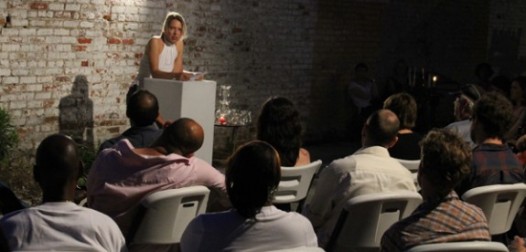
Anne Gisleson reads “Condolences from Death Row” at the Antenna Gallery Outdoor Auxiliary last year at a Room 220 event.
The current issue of the Oxford American includes a feature-length essay by Press Street co-founder Anne Gisleson, “Condolences from Death Row.” The essay, an early draft of which Gisleson read at a Room 220 event in May 2012, uses the author’s receipt of a letter from a death row inmate, who her attorney brother represented, as the jumping-off point to ruminate about their father’s recent death and her own mortality.
Gallows humor (which, as we learn through Gisleson’s descriptions of her father, clearly runs in the family) and an urgent sense of longing pervade the essay, which is yet another piece of evidence that one of New Orleans’ best prose writers is getting better before our eyes.
From “Condolences from Death Row”:
There are times in your life like that, in grief, in love, when you walk around like a live wire, meaning sparking off everything, and you go through the day dazzled and hurt. Maybe I was being oversensitive about the death row letter, but lately I was back in that place, feeling like Dante “midway in our life’s journey,” lost in the dark wood at the entrance of the Inferno and harassed by furry beasts of worldliness before Virgil shows up to guide him … Dante ultimately sees much of the redemption for his midlife crisis in the fantasy of a too-young girl, Beatrice. I guess men have always been built to disappoint. But I’m starting to think that the dark wood isn’t really so bad, and sometimes you run into people you know; sometimes sympathetic strangers. There can be camaraderie there—like, hey, we’re here together in the dark wood, can I pour you some more of this bourbon, can you recommend a good book? Was [the inmate’s] letter another low branch across the path or was it the murky green light that filters in between branches? And what about your kids? They’re happy enough, they’re fine, you can hear them in the sunny clearing nearby and you can always go join them. Sometimes you think it would be nice if we could widen these paths, make it easier for our kids when it’s their turn in the dark wood. But I think the best thing we can do is make sure they’re equipped. They can bring their own machetes, their own bourbon.
Read the complete essay – along with more outstanding writing, including a piece on Jazzland by N.O. writer Benjamin Morris – in the current issue of the Oxford American.
This article is reposted from Press Street: Room 220, a content partner of NolaVie.
 Earthtalk: “Cool Roofs” for New Orleans
It’s hot outside, but it could be cooler! In this article, Brooke Theis explores Cool Roofs, an effective solution to the urban heat island effect that makes the New Orleans heat so unbearable. The author also explores inequalities in how people experience the environment from identity perspectives like race and class.
Earthtalk: “Cool Roofs” for New Orleans
It’s hot outside, but it could be cooler! In this article, Brooke Theis explores Cool Roofs, an effective solution to the urban heat island effect that makes the New Orleans heat so unbearable. The author also explores inequalities in how people experience the environment from identity perspectives like race and class.
 Big Chem-EZ: How can small Louisiana communities access clean drinking water after a hurricane?
When I went to visit the Pointe-au-Chien tribe after Hurricane Ida with my Service Learning class, I heard that one of the biggest challenges in the aftermath of the hurricane was finding enough drinking water, so in this article, I explore water purification methods: 1) when they are necessary, 2) how they work, and 3) if they really make your water safe to drink.
Big Chem-EZ: How can small Louisiana communities access clean drinking water after a hurricane?
When I went to visit the Pointe-au-Chien tribe after Hurricane Ida with my Service Learning class, I heard that one of the biggest challenges in the aftermath of the hurricane was finding enough drinking water, so in this article, I explore water purification methods: 1) when they are necessary, 2) how they work, and 3) if they really make your water safe to drink.
